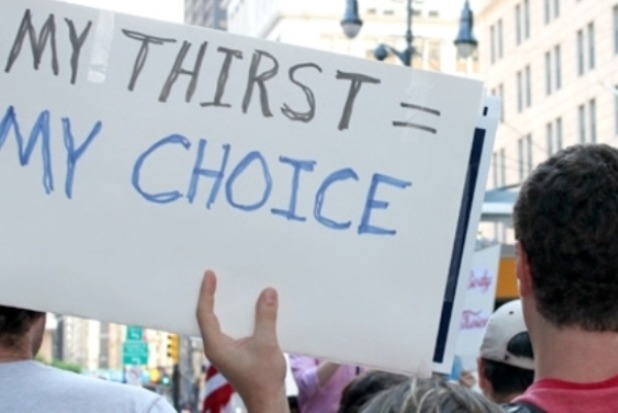The Short-Lived Life Of The Soda Ban Slideshow
May 30, 2012: Mayor Bloomberg Seeks to Restrict Large Sugary Drinks
People were unhappy with the soda ban from the start. With a new nickname,"Nanny Bloomberg," the mayor of New York City immediately sought to show that the ban was not to limit consumer choice, but to fight growing obesity rates. He told The New York Times, "Your argument, I guess, could be that its a little less convenient to have to carry two 16-ounce drinks to your seat in the movie theater rather than one 32-ounce... I dont think you can make the case that were taking things away."
June 2012: Everyone Freaks Out
Of course we loved the celebrity reactions to the New York City proposal to ban large, sugary drinks. Jerry Seinfeld's response: "I don't think I'm in favor. I'm in favor of continuing the accelerated Darwinian process of early death and weeding out most of the population through sugary drinks... I say, 'Fatten them up, kill them off, and move them out.' That would be my philosophy."
June 2012: Starbucks Freaks Out
Frappuccino lovers in New York also began to panic, while the CEO of Starbucks wonderedwhether the proposed soda ban would make a difference. Said Howard Schultz on CBS This Morning, "I'm not sure that he's going to achieve the results that he desires as a result of this initiative... I'm not sure it's the right approach, but we're obviously going to follow suit and respond to him because he's trying to do something that's quite important."
June 2012: Other Cities Begin Thinking About Soda Bans
The first city to consider a similar proposal? Cambridge, Mass. Mayor Henrietta Davis proposed a similar ban in a city council meeting, where it was met with opposition from other members of the city council. Then, Councilman Mitchell Englander in Los Angeles proposed a ban of soda vending machines in libraries and parks on top of an existing soda machine ban in schools. Richmond, Calif., also jumped on the bandwagon with a proposal to require businesses to have a license to sell sugary drinks, much like a liquor license.
July 2012: The Opposition Heats Up
Sassy subway ads were just the beginning. Beginning with the "cranberry caucus" (a real thing) and the American Beverage Association, the beverage industry began to fight back against Bloomberg's proposal. It first began with a radio spot from the New Yorkers for Beverage Choices Coalition, just in time for the first public hearing on the ban. As the drink lobby began rallying, so did the American Cancer Society, which urged the Surgeon General to look further into the links between sugary drinks and their impact on the public health.
Meanwhile, Taco Bell first launched the "breakfast cocktail," a soda for breakfast.
July 2012: Mayor Bloomberg Fights Right Back
The sassiest remarks a mayor can possibly make: "If you want to kill yourself, I guess you have the right to do it." That's what Bloomberg said in a press conference while New Yorkers protested outside. And after, more research came about thetruth about soda and sugary drinks. No one can't say he's not passionate about keeping New Yorkers healthy.
July 2012: The Battle Wages On
In July, the CEO of Coca-Cola, Muhtar Kent, sounded off on the soda ban, saying, "It is, I believe, incorrect and unjust to put the blame on any single ingredient, any single product, any single category of food." Out in California, the beverage industry fought against a proposed soda tax in El Monte, Calif., up on the ballot in November.
September and October 2012: The Opposition Grows Bigger
Among the newest fighters? In September, the New York chapter of the National Association of Theatre Owners joined the fight (rightfully so, as movie theaters make up to 40 percent of their profits from concession sales). On the opposite side, the Center for Science in the Public Interest released its own version of the polar bears Coke commercials,"the real bears" to highlight their views on the obesity epidemic.
October 2012: The Health-Conscious Movement Kicks In
While beverage-makers waged the fight, Coca-Cola took a different tactic by advocating for a health-conscious consumer. With a new calorie counter on the website and calorie labels on vending machines, Coca-Cola aimed to inform consumers about what they were drinking. But the company later caught flak for its anti-obesity ads that began airing in January.
October 12, 2012: The Beverage Industry Sues Over Soda Ban
One month after the Public Health Board passed the soda ban, the beverage makers and other groups took it to the courts.According to the lawsuit filed, the beverage industry believed that the ban should have gone through the city council, like previous health initiatives. (The American Beverage Association went after the proposed soda tax in El Monte, Calif., by spending $1.5 billion to stop it; voters in California didn't pass the tax initiatives in November.)
January 2013: A Date Is Set
The final date was set for March 12 for the soda ban to take effect, while everyone slowly began to freak about what large, sugary coffees they could keep drinking. More groups, like the New York Korean-American Grocers Association, the Hispanic Federation and the NAACP joined the opposition and tried to delay the soda ban from taking effect.
March 11, 2013: The Plot Twist
In the battle of beverage industry versus Bloomberg, round two was awarded to the beverage industry. One day before the soda ban was to take effect, Judge Milton Tingling defeated the soda ban in a ruling, calling it "fraught with arbitrary and capricious consequences." Bloomberg has said he will fight the decision, so everyone will keep guzzling the 32-ounces for as long as they can.
July and August 2012: New Yorkers Fight Back, Too
A poll from The New York Times said that 60 percent of New Yorkers were against the proposed soda ban. And the Million Big Gulp March may not have brought the strongest numbers to a rally, but it did bring lots of loud voices. "Its not the governments job to fight against obesity. Period," said one protester. "Its up to the individual in a free society, which America is supposed to be."
Backing Bloomberg? Weight Watchers and Jenny Craig voiced their support for the ban.












